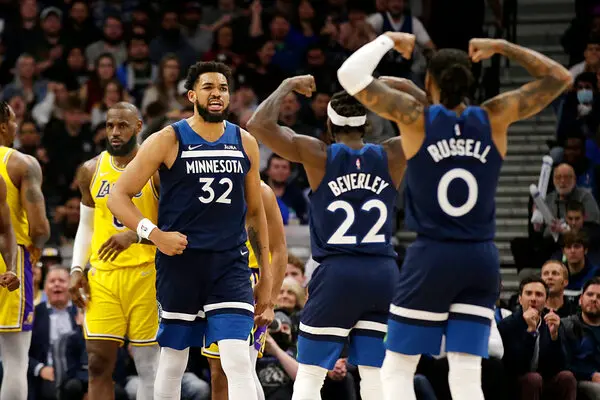
In the realm of the New York Knicks and head coach Tom Thibodeau, a palpable connection has always existed with Minnesota Timberwolves’ standout Karl-Anthony Towns. Given Thibodeau’s prior tenure in Minnesota, his established relationship with Towns suggests a potential synergy, although the suitability of Towns for the Knicks remains uncertain.
With the off-season looming, the possibility arises that Minnesota might entertain the idea of parting ways with Towns following an All-Star-caliber season, highlighted by his impressive 41.6% success rate from beyond the arc. For the Knicks, Towns could be viewed as a valuable addition.

Karl-Anthony Towns delivered impressive statistics last season, averaging 21.8 points, 8.3 rebounds, and three assists, alongside shooting percentages of .504 from the field and .575 for effective field goals. While Towns’ offensive abilities are undeniable, debates arise when comparing him to Julius Randle.
The pursuit of Towns by the Knicks would likely entail the departure of Randle, an All-NBA player and a formidable presence at power forward. However, an anonymous NBA executive hinted at the Knicks’ potential interest via Heavy.com, stating, “That team (the Timberwolves) is in flux. They want to keep building off what they did this year, but just can’t afford it. So I would think it is 100% expected that if they move on from him when the dust settles, the Knicks are going to be there.”
Knicks’ Financial Decisions and Off-season Targets
Towns is on the verge of signing a hefty four-year, $221 million designated veteran extension, which will result in a substantial $49.35 million cap hit for the 2024–25 season when he’ll be 29 years old. His salary will incrementally rise each year, peaking at $61.2 million by 2027. In contrast, Randle’s more manageable four-year, $117 million contract ends after the 2025–26 season, featuring a $30.1 million option, with a $28.9 million cost next season at age 30—a considerable savings compared to Towns’ deal.
When strategically analyzing both the financial aspects and performance, Randle emerges as the more cost-effective option, particularly given his comparable contributions to their respective teams. Randle has showcased his value, especially during postseason play, when healthy—a sharp contrast to Towns, who notably struggled against the Dallas Mavericks in the playoffs.
Given these considerations, the Knicks may opt to retain Randle rather than pursue the high-cost acquisition of Towns, especially given the financial ramifications and the potential risk of regression with Towns’ substantial future salaries.
Leave a Reply